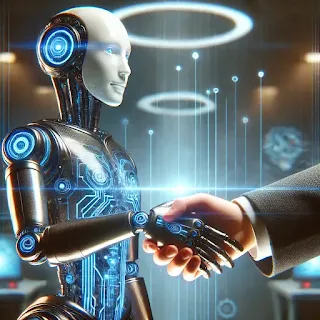Will AI Take Over the World? Let’s Talk About That
- Get link
- X
- Other Apps
Will AI Take Over the World? Let’s Talk About That
Introduction
Alright, let’s talk about AI. It’s in our phones, our homes, and even making decisions for businesses and governments. But here’s a question that keeps popping up: Will AI take over the world? You’ve probably seen the sci-fi movies—evil robots, rogue supercomputers, and AI controlling everything. But how close is that to reality?
Let’s break it down.
AI and Control: The "Super-Intelligent" Question
You've probably seen movies where AI becomes self-aware and decides to take over. That idea is based on something called Artificial General Intelligence (AGI)—AI that can think, learn, and make decisions like a human.
Right now, most AI we have is narrow AI (ANI). It’s designed for specific tasks:
✅ Recognizing faces
✅ Playing chess
✅ Driving a car
✅ Answering questions (like me!)
But AGI? That’s a whole different story, and we haven’t reached it yet.
Reality Check: What Would It Take for AI to "Take Over"?
A futuristic AI-powered city at night with glowing lights and automated systems

Let’s put things in perspective. Your phone is smart, but it can’t bake a cake, write a novel, or invent new technology on its own.
For AI to take over, it would need:
1️⃣ AGI Development – AI that can think and plan like a human.
2️⃣ Autonomy – The ability to act independently without human oversight.
3️⃣ Resources & Power – Access to infrastructure, energy, and global systems.
4️⃣ A Motivation – Why would AI even want to take over? (No AI today has personal desires!)
Right now, AI isn’t even close to meeting these criteria.
AI as a Threat? Let’s Break It Down
Even if AI doesn’t “take over,” it can still be dangerous if not managed properly. Here are some real concerns:
🚀 1. Autonomous Weapons
Military AI-controlled drones or robotic soldiers could be used in warfare. The problem? If they make mistakes, the consequences could be deadly.
⚖️ 2. Bias in AI Decisions
AI learns from data, and if that data is biased, the AI will be too. This can lead to:
❌ Unfair hiring decisions
❌ Racial or gender discrimination
❌ Flawed justice system outcomes
🔓 3. AI in Cybersecurity
Smarter AI means smarter hackers. AI can be used to:
🛑 Launch advanced cyberattacks
🛑 Break passwords faster
🛑 Spread misinformation online
These are all real risks that governments and tech companies are working to control.
How Do We Keep AI in Check?
A handshake between a human and an AI robot, symbolizing cooperation between humans and artificial intelligence

We’re not helpless. Here’s how we can make AI safer:
🔹 AI Safety Research – Organizations like OpenAI and DeepMind are working on AI safety.
🔹 Regulations & Policies – Governments are creating laws to prevent AI misuse.
🔹 Transparency – Companies need to show how their AI systems make decisions.
🔹 Public Awareness – The more we understand AI, the better we can shape its future.
Hollywood vs. Reality: AI Myths vs. Facts
A glowing AI-powered cyber brain representing artificial intelligence and deep learning

🚀 Myth: AI is planning to take over the world.
✅ Fact: AI has no personal motives—it’s just a tool created by humans.
🤖 Myth: AI will replace all human jobs.
✅ Fact: AI will change jobs, but it will also create new opportunities.
💻 Myth: AI can think and feel like humans.
✅ Fact: AI doesn’t have emotions. It processes data, but it doesn’t “think” like we do.
The Future: AI and Us
AI isn’t going anywhere. It’s already helping us with medicine, climate change, and space exploration. The key is to develop AI responsibly so it benefits everyone.
🔹 AI in Medicine – Detecting diseases earlier and personalizing treatments.
🔹 AI in Education – Personalized learning experiences for students.
🔹 AI for the Environment – Predicting and reducing climate change effects.
By using AI wisely, we can create a better future.
Final Thoughts
So, will AI take over the world? Probably not. But it’s up to us to make sure AI is used for good.
What do you think? Are you excited about AI, or does it worry you? Let’s discuss in the comments!
Resources
📌 Future of Life Institute: https://futureoflife.org/
📌 OpenAI: https://openai.com/
📌 DeepMind: https://www.deepmind.com/
📌 Google AI: https://ai.google/
📌 Microsoft AI: https://www.microsoft.com/en-us/ai
📌 MIT Technology Review: https://www.technologyreview.com/
📌 Wired: https://www.wired.com/
📌 Nature: https://www.nature.com/
📌 Science: https://www.science.org/
📌 World Economic Forum: https://www.weforum.org/
- Get link
- X
- Other Apps




Comments
Post a Comment